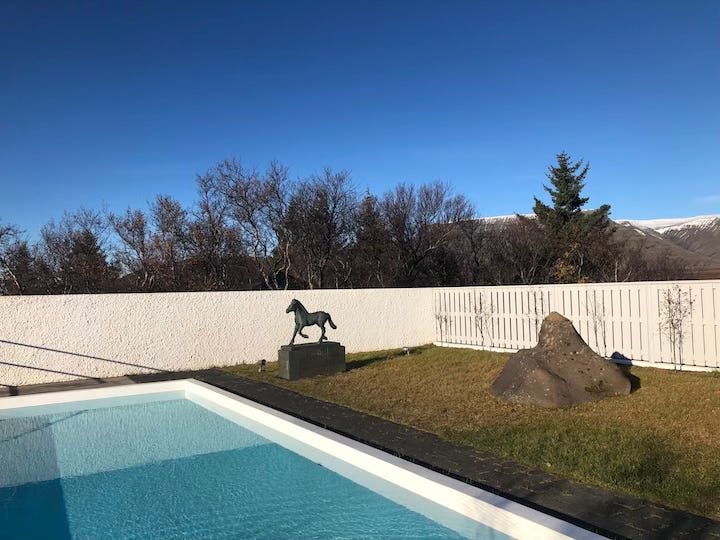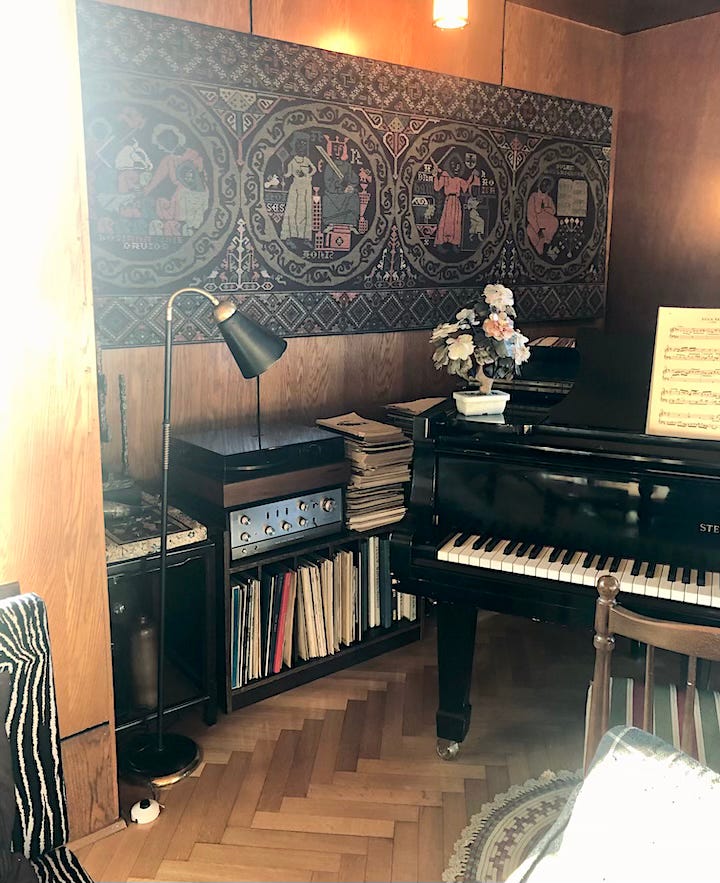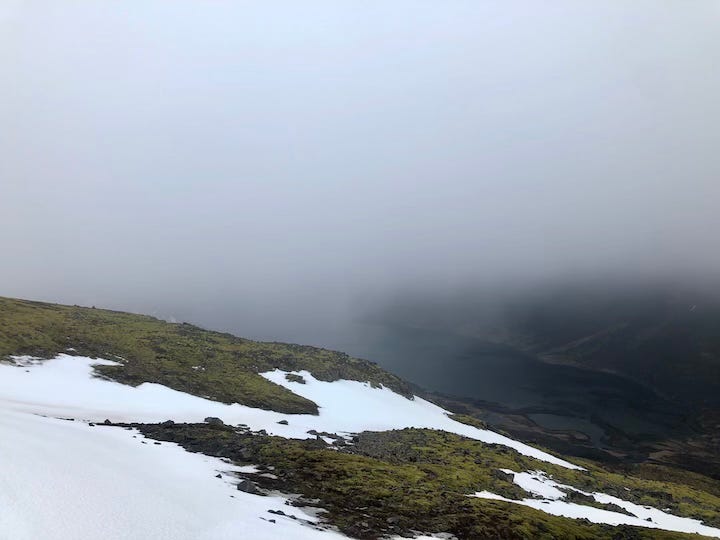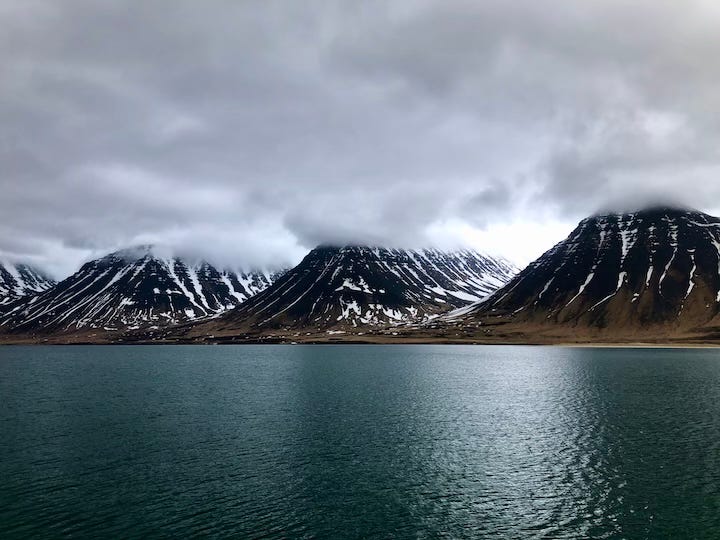Everything Is Material, Everything Is Interesting
My neighbour’s landlord is Icelandic, and he’s named after the Nobel prize winning Icelandic author Halldór Laxness. I know this because a delivery of shingles sat in our shared driveway for weeks, his name written across each cardboard box with a thick black marker. Throughout the winter, my neighbour’s landlord clears his side of the driveway with a snowblower that he doesn’t really know how to operate. He ends up blowing snow onto our windows and onto our car, as well as onto his tenants’ windows and car. He even blows snow onto passing cars on the street and pedestrians on the sidewalk. It is chaos the moment he starts marching around with that snowblower in front of him. The thing is, I don’t believe what he does is deliberately malicious because when he’s done his own truck is caked in snow and he has to scrape it off before driving away. Sometimes the entire front half of his body is also covered in snow—his chest, his face, his glasses. It’s kind of amazing.
At the beginning of every winter, I go out and talk to him about this. I ask him to please redirect the chute of his snowblower so it isn’t aimed at our windows when he passes by. I started asking because it freaked out our cat. He’d run and hide as soon as he heard the snowblower starting up out in the driveway. And when the snow and ice hit the windows, he’d meow in a low register from the back of a closet or from underneath the couch. After our cat died, I continued to ask my neighbour’s landlord to redirect the chute of his snowblower to avoid hitting our windows—I asked in honour of my dead cat, or maybe it was just out of habit. Every time I give him my little spiel, he nods as if he’s going to comply—but he never does. We’ve lived in this house for more than ten years now, and I have brought this up with him at the beginning of every winter since we moved in. I think he just really doesn’t know how the machine works and he has no interest in learning. There is a part of me that respects that kind of tenacity, that commitment. It shows character! After I talk to him following the first snowfall, and then after each subsequent snowfall, I close the curtains and put on loud music, that way I won’t see or hear the snow and ice hitting the windows, that way I can pretend it’s not happening. We got a lot of snow this past winter, and it felt very long.
I have a screen printed portrait of Halldór Laxness hanging on my dining room wall. I made it after visiting Laxness’ home in Mosfellsbær, Iceland. His home has been turned into a museum—pretty much left as it was when he and his family lived in the house. Laxness died in 1998, and in 2002, his wife, Auður, sold the house to the Icelandic state. His study and library are in tact, his standing desk, his piano. Even his record collection. There’s a swimming pool out back and sometimes teens sneak into the yard and go swimming at night. It was a beautiful spring day when I first visited the museum, unusually mild with bright sunshine heating up the pool. I was tempted to jump in there myself, and when I told the woman working at the museum this, she scrutinized my face to determine if I was serious or not. When I assured her that I was kidding, that I had no intention of actually jumping into Halldór Laxness’s swimming pool, she only nodded, unsmiling. I mention the Laxness portrait because I had an idea at the beginning of this past winter to take the framed portrait outside to show my neighbour’s landlord. I thought it’d be a way to ingratiate myself. I imagined impressing him with my Laxness knowledge—Did you know that Halldór Laxness was born Halldór Guðjónsson and later adopted the name Laxness because it was the name of the homestead he grew up on? I’d mention the house, the record collection, the teens jumping into the pool. I’d mention the original paintings and stained glass pieces by the artist Nína Tryggvadóttir that hang on the walls, and that I was so taken with during my first visit that I went back to Iceland a year later to research Tryggvadóttir’s life and work for a book project. My plan was to tell him all of that and to then slowly redirect the conversation to the handling of his goddamn snowblower.
But in the end, it all felt like too much. And honestly, I don’t think I would have gotten a new result had I done any of that. So instead, I went out there after the first significant snowfall of this past winter and I asked him, just as I had asked every other year, to please not let the snow and ice hit our windows. He looked back at me through his snow covered glasses and kind of nodded in a way that was more of a shrug, like “sorry buddy, nothing I can do about it, this is just how it is”. As I walked back up the steps and onto our porch, snow from my neighbour’s landlord’s snowblower started shooting directly at our porch as if out of a cannon. I had to duck and run across the porch to avoid getting hit. This really happened, and it felt a little deliberate; in that moment, it felt like he knew exactly how to operate that goddamn machine.
I woke up thinking about my neighbour’s landlord the other day because I had met Eileen Myles the previous night and then it snowed. My neighbour’s landlord hadn’t yet shown up when I got out of bed that morning, but I expected him to arrive at any moment—and I knew that I’d become aware of his arrival as soon as the snow started hitting our windows. Since I was in the middle of getting ready to return to Iceland, I considered going out to the driveway when he arrived and telling him about my upcoming trip—and then, with him distracted thinking about his homeland, maybe I could wrest control of the snowblower from him and do it myself. But it was almost April at that point, winter would soon be over, so there was really no point bothering. Even if I somehow got through to him, I’m sure he’d forget by next winter.
As for Eileen Myles, she was in town that night for a poetry reading. Afterwards, we chatted for a little while about poetry, of course, but also about diners and notebooks and Iceland. All the important stuff. Sometimes at a reading, I’ll stand in front of the reader and try to channel the kind of person I’d like to see out in the audience—someone who is listening intently and laughing at all the right moments. Myles acknowledged this—without my prompting!—and told me how nice it was to look out into the audience and see me standing there, so invested in their reading. I really love Myles’ work and their approach to writing—in a way, they try not to distinguish between one form and another: it’s all just writing. There’s an openness to them and to their work, a fearlessness. They are also 76 years old and cool as hell. I wish I was that cool. Myles wrote a book called The Importance of Being Iceland which came out in 2009. I first read it before visiting Iceland for the first time nearly a decade ago. In a small way, that title essay helped guide how I travel as a writer: more openly, more fearlessly because in that book, Myles approached their travel with more openness, more fearlessness—much more than what comes naturally to me. I’m not a great traveler. I get motion sickness in cars and buses. I’m not terribly friendly, and so I’m not always interested in making friends. I like sleeping in my own bed. I despise sharing a bathroom with strangers. I don’t like having to speak to anyone before 10 am. Maybe even 11. Noon on some days. But if I leave home with a purpose, if I go somewhere expressly to write, it changes everything because everything is material, everything is interesting. Reading that essay put me in a different frame of mind when I arrived in Iceland that first time. In a good way. Of course, the essay is about so much more than that—it’s about uncertainty and art, gender and identity. It’s also funny, which makes sense when you consider the title it’s playing on.
I’m back in Iceland now to work on some essays for a book. Spring is slowly unfolding across the country, and everyone I talk to is excited for me that I’ll be here for the beginning of summer—such as it is. A few of the essays for this book I’m working on will be coming out later this year. One of them will be published as a chapbook sometime this spring. That one’s called “How To Write One Story”. It’s about some of the ways the original spark of inspiration for a story can get turned into an actual story. Using examples from some stories I have loved over the years, I try to dig into the creative process a little. This essay is part of a planned slow roll out for the collection of stories I have coming out early next year with Gaspereau Press (because the essay also ties into one of the stories from that book). The other two essays are coming out in some magazines, and are more personal in nature. While I’m here, I’ll be working on a longer essay about why I keep coming back to Iceland. I still don’t know the answer. Which kind of stresses me out. The other thing stressing me out right now is that I don’t think I brought enough books with me to last the duration of my stay. I’ll have to read slowly.
Back at home, it snowed overnight, which is a bit unusual for April. My wife sent me a photo of the snow covered street. I know that at any time now, my neighbour’s landlord will be arriving outside the house with his snowblower, and the snow and ice will start hitting the windows soon after. And it will cover our car, and the neighbour’s car, and it will cover my neighbour’s landlord himself. There’s a part of me that wishes I was there to see it one last time before spring fully arrives and he puts his snowblower away for the season. I guess there’s something comforting about that kind of dependable repetition, about knowing what is going to happen and when. Like snow hitting my window, like a man covered in snow. The opposite is also true because I think there’s a comfort in not knowing, too. Maybe he won’t show up, maybe he’s visiting family in Iceland. Maybe he’s outside the place where I’m staying right now, just waiting for snow to fall so he can shoot it up at my window. Maybe it has all been leading to this moment. It’s not impossible. Nothing is.






